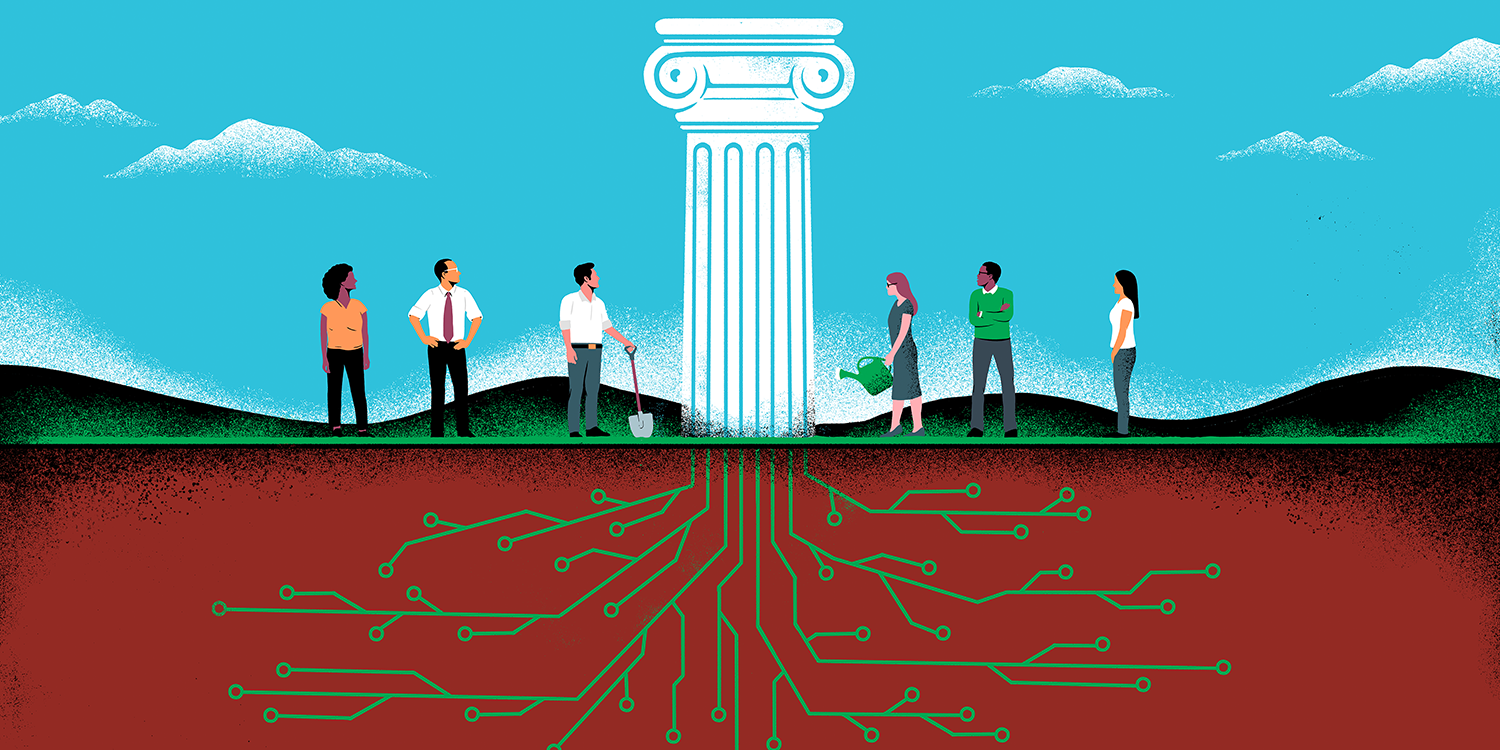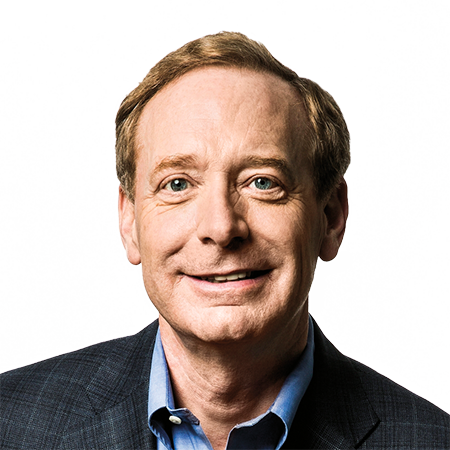Envisioning Our Digital Future
An opening note from the President of Microsoft

Illustration by SÉBASTIEN THIBAULT
This is a time in human history unlike any other. As the world proceeds through this period of digital transformation, we are rapidly uncovering the potential for technology to improve lives and address some of humanity’s greatest challenges. This has been especially apparent over the past two years as countries everywhere have responded to the disruption and fallout of a global pandemic by leveraging greater connectivity to mitigate its worst impacts. Seemingly overnight, entire industries shifted to remote models. Virtual environments became the safest, preferred options for people to continue working, learning and connecting with loved ones. Digital technologies enabled us to track the spread of COVID-19 and powered the medical research that produced lifesaving vaccines.
We have only scratched the surface of what is possible in this new domain of human activity — cyberspace. In the next 10 years, we will see half of the world’s population connect to the internet for the first time. This alone will open a world of possibilities for social and economic advancement. Meanwhile, new and emerging technologies will transform the impact of innovation, helping us navigate risks and reduce the harm of threats such as climate change. But such progress depends upon a safe, secure and rights-respecting digital infrastructure that is resilient and open to all.
Cyberspace has become much more than just a modern domain of human productivity; it is increasingly a domain of conflict. Governments and bad actors alike continually refine their methods of targeting adversaries with offensive tools that undermine collective trust and security. This year began amid cascading revelations surrounding the scale and impact of the 2020 SolarWinds hack, which was followed closely by news of damaging cyberattacks against governments, hospitals, food suppliers and aid agencies. And while not all of these attacks are attributed to a state actor, when governments invest in developing advanced offensive capabilities, those capabilities are quickly proliferated and appropriated by other malicious actors, thereby increasing cyber risk for everyone.
Despite advances and investments in cyber defenses and international agreements that aim to rein in reckless state behavior online, conflict in cyberspace continues to escalate. The bottom line is more must be done to enhance stability and security online. And government action alone will not solve the problem. To truly put irresponsible behavior out of bounds, we need to strengthen international rules even as we thwart the rise of cybercrime and the emergence of markets that cater to the development of offensive cyber capabilities for criminal use. To accomplish all this, we need cooperation between benevolent state actors and private sector allies to set and enforce expectations and to hold bad actors accountable with greater consequences. Rules are just words on paper if they are not enforced.
I recognize this is much easier said than done. Cyberspace is inherently different from other domains of conflict due to the overlapping responsibilities that exist across stakeholder groups. The private sector owns and operates the majority of the digital world where competition and conflict among governments is now taking place. As a result, peace and security in cyberspace will require innovative new models of cooperation among and across stakeholders.
With this need for collaboration and fresh thinking in mind, Microsoft has partnered with FP Analytics, the independent research division of Foreign Policy magazine, to bring you this special publication, “Securing Our Digital Future.” In the articles that follow, luminaries from around the world address different dimensions of this challenge and explore possible paths forward. It is my hope that this collection will draw attention to the need to protect cyberspace as a domain of human — and humane — activity, and spark new conversations about how best to do so together.
Brad Smith is president of Microsoft. In this role, he leads a team of more than 1,500 business, legal and corporate affairs professionals located in 54 countries and operating in more than 120 nations. He plays a key role in spearheading the company’s work on critical issues involving the intersection of technology and society, including cybersecurity, privacy, artificial intelligence, environmental sustainability, human rights, immigration and philanthropy. In his recent bestselling book, coauthored with Microsoft’s Carol Ann Browne, “Tools and Weapons: The Promise and the Peril of the Digital Age,” Smith urges the tech sector to assume more responsibility and calls for governments to move faster to address the challenges that new technologies are creating. The New York Times has called Smith “a de facto ambassador for the technology industry at large” and The Australian Financial Review has described him as “one of the technology industry’s most respected figures.” He has testified numerous times before the U.S. Congress and other governments on these key policy issues.
Smith joined Microsoft in 1993, first spending three years in Paris leading the legal and corporate affairs team in Europe. In 2002, he was named Microsoft’s general counsel and spent the following decade leading work to resolve the company’s antitrust controversies with governments around the world and companies across the tech sector. Over the past decade, Smith has spearheaded the company’s work to advance privacy protection for Microsoft customers and the rights of DREAMers and other immigrants, including bringing multiple lawsuits against the U.S. government on these issues.
Prior to joining Microsoft, Smith was an associate and then partner at the law firm of Covington and Burling, where he is still remembered as the first attorney in the long history of the firm to insist (in 1986) on having a personal computer on his desk as a condition for accepting a job offer. In addition to his work at Microsoft, Smith is active in several civic organizations and in the broader technology industry. He has served on the Netflix board of directors since 2015 and chairs the board of directors of both Kids in Need of Defense (KIND) and the Washington State Opportunity Scholarship program.
Smith grew up in Appleton, Wisconsin, where Green Bay was the big city next door. He attended Princeton University, where he met his wife, Kathy. He earned his J.D. from Columbia University Law School and studied international law and economics at the Graduate Institute in Geneva, Switzerland.


